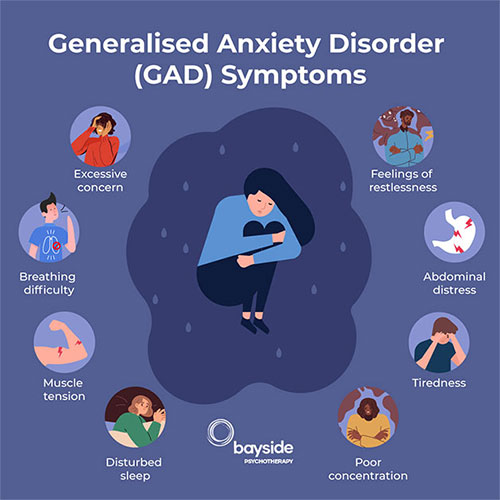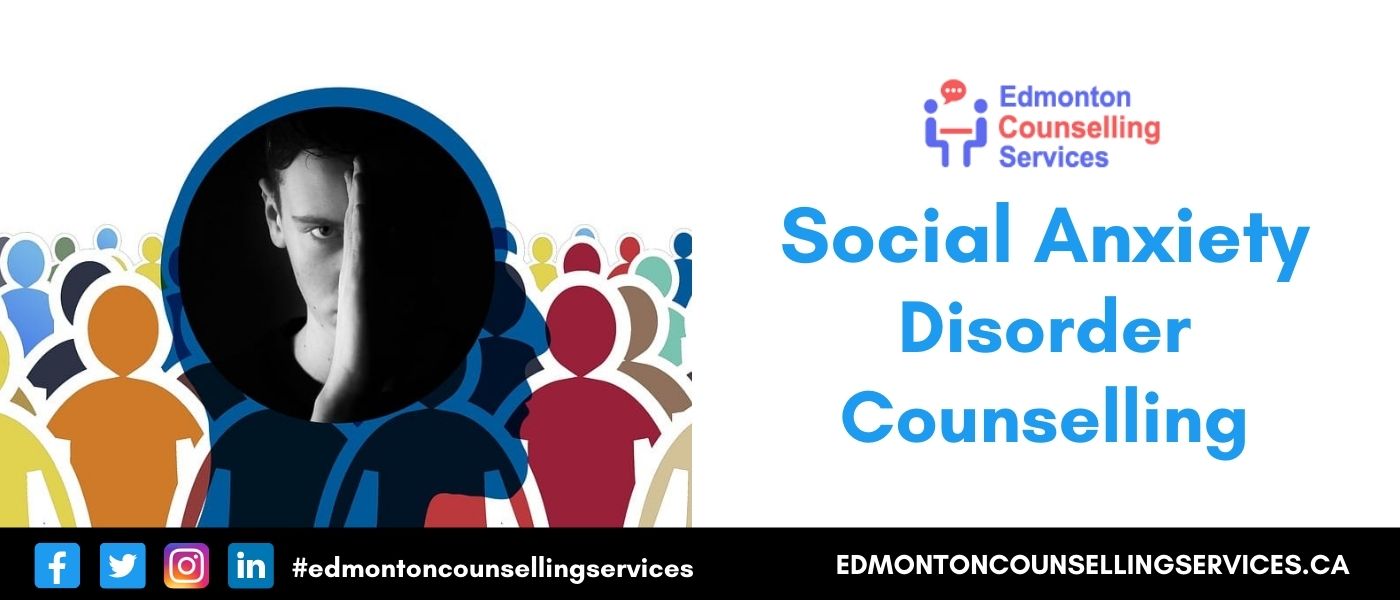Explore research-backed techniques through counselling for anxiety disorder programs
Explore research-backed techniques through counselling for anxiety disorder programs
Blog Article
Discovering Various Approaches in Counselling for Stress And Anxiety Disorder for Lasting Modification
When dealing with stress and anxiety problems, it's crucial to explore a variety of counseling techniques. Each technique supplies special insights and devices to help you handle your signs and symptoms successfully. You could find that combining techniques can yield the best results. Understanding the subtleties of these methods is essential to promoting long-term change. What happens if the ideal mix could release a new degree of psychological health for you?
Recognizing Anxiety Disorders: A Brief Overview
Anxiety problems, which influence numerous individuals worldwide, can considerably affect daily life. You may experience frustrating sensations of anxiety or fret that appear unmanageable. These sensations can cause physical signs and symptoms like a racing heart, sweating, and even lightheadedness. Typical kinds of stress and anxiety conditions include generalized anxiousness disorder, panic attack, and social stress and anxiety disorder. Each has special indicators, yet they all share a tendency to interrupt your routine and relationships.Understanding the source of your anxiety is vital. It could come from genes, mind chemistry, or life experiences. Acknowledging your triggers can aid you handle your reactions much better. It is essential to keep in mind that you're not alone in this battle. Many individuals deal with comparable obstacles, and seeking assistance is a solid step towards sensation much better. By discovering regarding anxiousness conditions, you're already on the course to understanding and managing your condition more properly.
Cognitive-Behavioral Therapy: Testing Negative Idea Patterns
In Cognitive-Behavioral Therapy, you'll start by determining the adverse thought sets off that add to your anxiety. Once you identify these ideas, you'll service changing them with even more favorable alternatives. With each other, you'll construct efficient coping techniques to assist handle your anxiety in daily situations.
Identifying Unfavorable Idea Triggers

When you encounter moments of distress, acknowledging the details triggers behind your unfavorable ideas can be important in handling anxiousness. Beginning by focusing on situations that provoke feelings of worry or concern. Is it a jampacked room, a future due date, or a discussion with specific people? Write down these instances in a journal. This will aid you recognize patterns in your reasoning. Notice physical sensations that accompany your negative ideas, like an auto racing heart or tightness in your breast. By identifying these triggers, you acquire insight into what's sustaining your anxiety. Comprehending these connections is the very first step in challenging those thoughts and eventually restoring control over your psychological feedbacks.
Replacing Ideas With Positives
Challenging adverse thought patterns is a crucial step in changing your state of mind and reducing stress and anxiety. You might typically find on your own trapped in cycles of insecurity or devastating thinking. As opposed to letting these ideas determine your sensations, method changing them with favorable affirmations or realistic choices. When you think, "I can not handle this," change it to, "I can manage difficulties one step at a time." This simple change can considerably influence your emotion. Regularly determining and responding to these unfavorable ideas aids produce a much healthier inner discussion. Remember, it takes some time and effort, however consistently practicing this technique can lead to long lasting change, equipping you to deal with anxiousness with restored self-confidence and resilience.
Structure Coping Methods With Each Other
Changing negative ideas is just the start of managing anxiety properly. To produce long lasting modification, you need to build coping strategies that empower you. Cognitive-Behavioral Treatment (CBT) aids you identify and test those purposeless idea patterns. Together, you and your counselor can explore just how these ideas influence your feelings and behaviors.Start by developing useful strategies, like journaling or mindfulness exercises, that enable you to challenge stress and anxiety head-on. When you face your anxieties slowly, you'll learn to react in different ways.

Mindfulness and Acceptance-Based Approaches: Cultivating Present-Moment Recognition
As you browse the complexities of stress and anxiety, integrating mindfulness and acceptance-based approaches can substantially enhance your ability to grow present-moment awareness. By concentrating on the present moment, you'll locate that you can observe your thoughts and sensations without judgment (Counseling services for anxiety). This practice assists you acknowledge your anxiety without really feeling overwhelmed by it.Engaging in mindfulness workouts, such as deep breathing, body scans, or directed meditations, allows you to ground yourself in your existing experience. Acceptance-based approaches encourage you to accept your emotions as opposed to battle against them. They shed their power over you.Incorporating these techniques into your daily routine can change just how you react to anxiety when you accept your feelings. You'll establish resilience and discover to browse demanding circumstances with higher convenience. Ultimately, cultivating present-moment understanding lays the structure for long-term change, equipping you to lead an extra meeting life
Direct Exposure Therapy: Facing Concerns Progressively
Direct exposure treatment helps you confront your worries in a progressive means, making it less frustrating. You'll discover strategies to face anxiety-provoking scenarios detailed, while additionally constructing coping approaches to handle your responses. This strategy encourages you to take control and lower anxiousness with time.
Steady Direct Exposure Techniques

When encountering stress and anxiety, slowly confronting your fears can be an effective method to restore control. This technique, called steady direct exposure, includes gradually revealing yourself to the circumstances or things that activate your anxiety. Beginning with less daunting situations and progressively work your means up to even more challenging ones. If you're scared of public talking, you may begin by talking in front of a mirror, then advance to sharing thoughts with a good friend, and eventually address a little team. Each step aids desensitize you to the anxiety, developing your confidence gradually. Keep in mind, it's important to rate on your own and celebrate small success as you move via this process, strengthening your capability to take care of anxiety efficiently.
Structure Coping Approaches
Structure effective coping techniques is necessary for taking care of anxiousness, especially as you confront your worries slowly - Counseling services for anxiety. One powerful technique is direct exposure treatment, where you begin by encountering your anxieties in a regulated fashion. Begin with less intimidating circumstances and slowly work your method approximately even more challenging situations. This steady exposure helps desensitize you to anxiousness triggers, making them much less overwhelming.Incorporate relaxation methods, such as deep breathing or mindfulness, to relax your mind throughout direct exposure. Track your development, commemorating little success along the method to improve your confidence. Keep in mind, it's all right to take your time; the objective isn't excellence but constant enhancement. By building these approaches, you'll equip yourself to browse anxiety and accept life more fully
Psychodynamic Treatment: Discovering Origin of Anxiety
Psychodynamic treatment checks out the unconscious mind, revealing the source of your anxiousness. By examining your thoughts, sensations, and previous experiences, this technique assists you discover underlying disputes and unsettled issues that may add to your existing stress and anxiety. You'll function with a specialist to explore childhood years experiences, partnerships, and psychological patterns that shape your feedbacks today.As you get insight right into these deeper layers of your subconscious, you'll start to recognize exactly how past occasions influence your existing behavior. This understanding can bring about catharsis, enabling you to refine emotions you might have suppressed.Through the restorative relationship, you can additionally determine defense devices that may have created gradually, providing a more clear path to transform. Eventually, psychodynamic therapy outfits you with the devices to resolve your anxiousness at its core, advertising long-term transformation in your emotional wellness.
All Natural and integrative Approaches: Integrating Techniques for Greater Effectiveness
Incorporating numerous therapeutic strategies can enhance your journey towards taking care of stress and anxiety extra efficiently. By integrating components from cognitive-behavioral therapy, mindfulness methods, and all natural methods, you can produce a customized approach that addresses your one-of-a-kind needs. You might use cognitive-behavioral techniques to test unfavorable thought patterns while integrating mindfulness workouts to ground on your own in the present moment.Additionally, checking out alternative methods such as yoga or meditation can promote relaxation and reduce anxiety symptoms. This blend allows you to develop greater self-awareness and resilience.Experimenting with these diverse methods can help you discover what resonates most with you. Keep in mind, it has to do with locating a synergy that works, instead than sticking to a solitary technique. This integrative method not only check here uses prompt relief but additionally cultivates long-lasting abilities for handling anxiousness, equipping you to recover control over your life.
The Role of Support Systems: Building Strength Through Connection
While it could seem that handling anxiety is a singular journey, having a solid support group can play a crucial duty in your strength. Surrounding yourself with empathetic good friends, family members, or assistance teams creates a risk-free room where you can freely share your experiences and sensations. When you attach with others, you advise yourself that you're not alone in this struggle.These connections provide motivation and can give sensible coping approaches that have helped others. It's likewise a possibility to obtain point of view; buddies can aid you see situations in different ways, decreasing sensations of isolation.Moreover, emotional assistance fosters a sense of belonging, which can greatly ease anxiety signs and symptoms. By leaning on your support system, you can construct durability and take on challenges extra efficiently. Bear in mind, connecting for help signifies stamina, and it can make all the distinction in your trip toward managing stress and anxiety.
Regularly Asked Questions
What Are the Common Signs of Anxiousness Disorders?
You may experience uneasyness, exhaustion, difficulty concentrating, irritation, muscular tissue tension, and rest disruptions. Physical signs can include rapid heart beat, sweating, and shivering. Acknowledging these indications early can aid you look for suitable assistance and treatment.
How Much Time Does Therapy Normally Last for Stress And Anxiety Problems?
Therapy for stress and anxiety problems typically lasts anywhere from a few weeks to a number of months. It truly depends upon your specific demands, progress, and the techniques your specialist utilizes to assist you handle your anxiety successfully.
Can Drug Be Used Along With Therapy for Anxiousness?
Yes, medicine can absolutely be made use of together with treatment for stress and anxiety. Integrating both methods typically improves treatment effectiveness, helping you take care of symptoms while exploring underlying problems with counseling (Counseling services for anxiety). Constantly consult your doctor for customized recommendations
Exist Self-Help Methods for Handling Anxiety?
Yes, there are several self-help techniques for handling stress and anxiety. You can exercise mindfulness, take part in routine exercise, keep a balanced diet plan, establish a regular, and make use of deep breathing techniques to help in reducing anxiousness signs effectively.
Just how Do I Know if I Need Specialist Help for Anxiousness?

Report this page